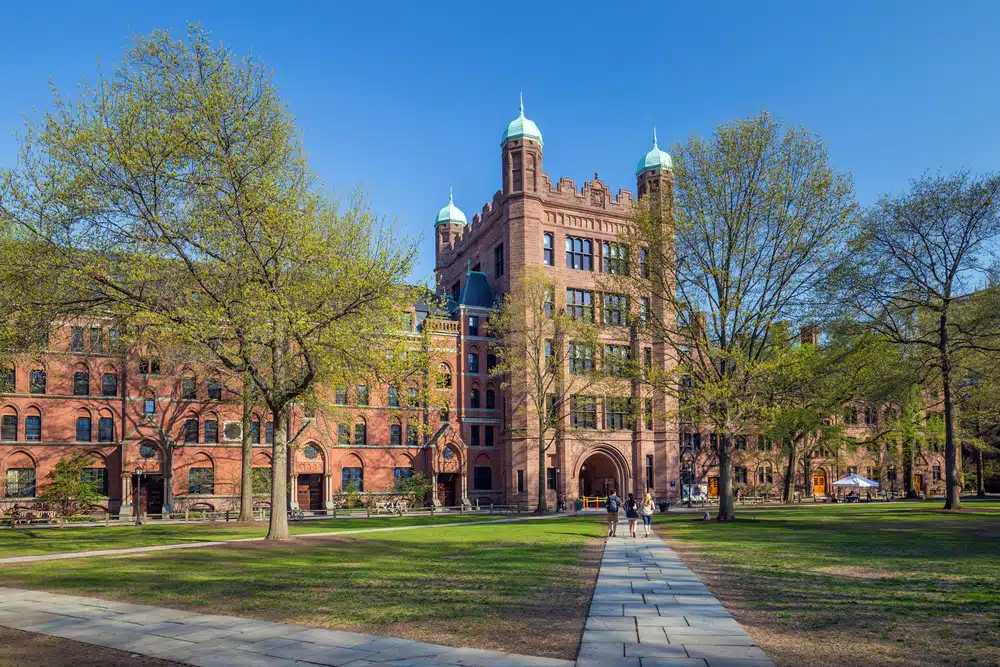Exploring the Rich Traditions of Yale University
Yale University is a pillar of academic prestige and historical significance, steeped in rich traditions that have shaped its identity over centuries. Founded in 1701, Yale has developed into an institution known for its rigorous academic programs, vibrant cultural activities, and various university traditions. This article provides a comprehensive overview of the university’s history and the practices that uphold its spirit.
The Historical Background of Yale University
Understanding Yale begins with delving into its intriguing historical background. Yale University, located in New Haven, Connecticut, is the third-oldest institution of higher education in the United States. Named after Elihu Yale, a Welsh merchant who significantly contributed to the college, the university has grown exponentially over the centuries.
Yale University’s rich history is intertwined with the growth and development of the United States. From its humble beginnings as the Collegiate School in Saybrook Colony, Connecticut, in 1701, the university has played a pivotal role in shaping the nation’s educational landscape.
The Founding of Yale
Yale was initially chartered as the Collegiate School in Saybrook Colony, Connecticut, in 1701. Its goal was to educate Congregational ministers, a mission reflecting the religious happenings of that time. The naming of Elihu Yale in 1718 resulted from his generous donation, which supported the construction of a new college building in New Haven.
Elihu Yale’s contribution to the college was financial and intellectual. His vision for the institution was to create a place of learning that would foster critical thinking, intellectual curiosity, and a deep understanding of the world. This vision laid the foundation for Yale’s future growth and success.
As the years passed, Yale University expanded its reach and influence, attracting students and faculty worldwide. The university became known for its rigorous academic programs and commitment to teaching and research excellence.
Yale’s Growth and Expansion
The university gradually enhanced its curriculum to cover a broader spectrum of subjects, particularly with the introduction of the sciences and humanities. By the 19th century, the institution started to embrace a more comprehensive educational approach, paving the way for its growth throughout the 20th and 21st centuries.
During this period, Yale University experienced significant growth in its physical infrastructure and academic offerings. New buildings were constructed, libraries were expanded, and new departments and programs were established. The university’s commitment to innovation and intellectual exploration attracted renowned scholars and researchers, further solidifying its reputation as a leading institution of higher education.
Today, Yale University is a testament to the power of education and the pursuit of knowledge. Its historic campus, with its beautiful architecture and lush green spaces, serves as a reminder of the university’s enduring legacy. As Yale continues to evolve and adapt to the changing needs of society, it remains committed to its mission of educating future leaders and advancing knowledge for the betterment of humanity.
Yale’s Unique Traditions
Beyond a rich academic history, Yale is marked by numerous unique traditions that imbue the student experience with camaraderie and belonging.
Yale, with its prestigious reputation, is known for its academic excellence and its vibrant traditions that have been passed down through generations of students. These traditions add a touch of nostalgia to the Yale experience and foster a strong sense of community among its students.
The Tap Day Tradition
One of Yale’s oldest traditions is “Tap Day”. Initiated in the 19th century, senior societies select or “tap” juniors to become their members. This tradition is steeped in secrecy and anticipation as youngsters eagerly await to see if they will be chosen to join one of these prestigious societies. The selection process is shrouded in mystery, with seniors carefully observing and evaluating their classmates throughout the year. On Tap Day, selected juniors are publicly announced and celebrated, marking their induction into these exclusive societies. It’s an annual tradition that gathers enormous attention and has become a unique aspect of the Yale community’s social landscape.
The significance of Tap Day goes beyond the honor of being chosen. It represents the continuation of a legacy, as these societies have been an integral part of Yale’s history for decades. Being tapped grants students access to a network of influential alumni and provides a platform to make a lasting impact on campus and beyond. The bonds within these societies often last a lifetime, creating a strong sense of belonging and camaraderie among its members.
The Yale-Harvard Regatta
The Yale-Harvard Regatta is another long-standing tradition that showcases the rich athletic history of Yale. It’s the oldest collegiate boat race in the United States, and it’s a highly respected event in the close-knit world of rowing. Dating back to 1852, this annual competition between Yale and Harvard attracts spectators from universities and beyond.
Months of rigorous training and preparation leading up to this prestigious event, with rowers dedicating countless hours to perfecting their technique and building their endurance. The regatta takes place on the Thames River, providing a picturesque backdrop for the intense rivalry between these two Ivy League powerhouses. The race is a thrilling spectacle, with the rowers’ synchronized movements and the spectators’ thunderous cheers creating an electric atmosphere.
Aside from the competitive nature of the race, the Yale-Harvard Regatta is also an opportunity for students, alumni, and the wider community to come together and celebrate the spirit of sportsmanship and tradition. It serves as a reminder of Yale’s rich history and legacy, not only in academics but also in athletics.
Yale’s Academic Traditions
Yale’s commitment to intellectual growth is reflected in its academic traditions. These traditions shape the educational experience and contribute to the unique atmosphere that distinguishes Yale from other universities.
The Residential College System
The residential college system, inspired by the models of Oxford and Cambridge, is a focal point of Yale’s undergraduate life. Each college has a unique character and creates a small community within the university, fostering intellectual and social engagement.
Students can live and learn alongside their peers within the residential college system, forming close-knit communities beyond the classroom. The colleges provide a supportive environment where students can form lasting friendships, engage in meaningful discussions, and collaborate on various projects.
Moreover, the residential college system at Yale offers a wide range of extracurricular activities, from student-run clubs and organizations to cultural events and performances. These activities further enhance the sense of community and allow students to explore their interests outside of the academic realm.
The Yale Seminar Tradition
Yale places a heavy emphasis on seminar-style classes that encourage dialogue and debate. The Yale seminar tradition fosters critical thinking and interfaces between faculty members and students.
Students can engage in lively discussions with their peers and professors in these intimate seminar settings. The small class sizes allow for a more personalized learning experience, where students can actively participate, ask questions, and challenge ideas. This interactive approach to education enhances students’ understanding of the subject matter and encourages them to think critically, analyze different perspectives, and develop their unique viewpoints.
Furthermore, the Yale seminar tradition extends beyond the classroom. Students often continue their discussions and debates outside of class, further deepening their understanding of the material and building intellectually solid connections with their peers. These intellectual exchanges contribute to the vibrant academic community at Yale, where learning is not limited to formal class hours but permeates every aspect of campus life.
In conclusion, Yale’s academic traditions, including the residential college system and the Yale seminar tradition, are crucial in shaping the university’s educational experience. These traditions foster intellectual growth, encourage collaboration, and create a vibrant community where students can thrive academically and personally.
Yale’s Cultural and Artistic Traditions
Culture and arts are infused into Yale’s campus life. Yale has an impressive array of cultural and artistic traditions, reflecting its commitment to broadening students’ perspectives and enhancing their creativity.
Yale’s dedication to the arts can be seen through the various student organizations and programs that promote artistic expression. One such organization is the Yale Dramatic Association, affectionately known as “The Yale Dramat”. Established in 1900, it is the second-oldest college theater company in the country. The Yale Dramat has played a pivotal role in shaping the careers of numerous talented artists who have achieved great success on Broadway and Hollywood. Through its productions, the Yale Dramat provides students a platform to explore their passion for acting, directing, and all aspects of theatrical production.
Another longstanding tradition at Yale is the Yale Glee Club, one of the oldest collegiate choruses in the United States. Founded in 1861, the Glee Club has a rich history of musical excellence and has become an integral part of Yale’s music tradition. The club’s members, consisting of undergraduate and graduate students from various disciplines, create harmonious melodies that resonate throughout the campus and beyond. Known for their versatility, the Yale Glee Club performs a diverse repertoire, encompassing everything from early sacred music to contemporary compositions. Their annual concerts are highly anticipated events that showcase the incredible talent and passion of Yale’s student musicians.
In addition to these prominent organizations, Yale offers students various artistic opportunities to explore their creative interests. The university boasts numerous art galleries where students can immerse themselves in visual arts and engage with thought-provoking exhibitions. These galleries serve as platforms for established and emerging artists, fostering a vibrant artistic community within the campus.
Furthermore, Yale’s commitment to cultural diversity is reflected in the various multicultural organizations and events celebrating different traditions and perspectives. From dance troupes showcasing traditional folk dances to cultural festivals highlighting cuisine and customs worldwide, these initiatives allow students to engage with different cultures and broaden their understanding of global society.
Overall, Yale’s cultural and artistic traditions testify to the university’s belief in the transformative power of the arts. By providing students with opportunities to explore their creative passions and engage with diverse cultural experiences, Yale fosters an environment where artistic expression thrives and enriches the lives of its students.
Yale’s Athletic Traditions
Yale maintains an active, athletic culture to complement intellectual pursuits, hosting various sports competitions and fostering a solid athletic tradition.
Yale’s commitment to athletics goes beyond simply providing opportunities for students to engage in physical activities. The university recognizes the importance of a well-rounded education, including academic excellence, physical fitness, and sportsmanship. As a result, Yale has established a rich tradition of athletic achievements that have become an integral part of the university’s identity.
The Yale-Harvard Football Game
The annual Yale-Harvard football game, known as “The Game,” garners standout attention among the athletic traditions. This event has been a highlight of the Ivy League football season since its introduction in 1875.
The rivalry between Yale and Harvard is legendary, and the football game between the two schools is the pinnacle of this intense competition. Every year, students, alumni, and fans eagerly anticipate this historic clash, which showcases the best of college football. The atmosphere in the stadium is electric, with the roaring crowd, the marching bands, and the cheerleaders all adding to the excitement. The game is not just about football; it celebrates the spirit and camaraderie between these two prestigious institutions.
Over the years, the Yale-Harvard football game has produced some unforgettable moments. From thrilling last-minute comebacks to record-breaking performances, the game has become a platform for athletes to showcase their skills and leave a lasting legacy. The tradition of “The Game” has become deeply ingrained in the hearts of Yale students and alumni, reminding them of their shared history and the bonds that tie them together.
The Tradition of Handsome Dan, the Bulldog Mascot
One cannot discuss Yale without mentioning Handsome Dan, the bulldog mascot. Several bulldogs have held this title, and the current Handsome Dan XVIII remains a cherished university symbol.
The tradition of having a live bulldog as the university’s mascot dates back to 1889, when the first Handsome Dan debuted. Since then, each successive Handsome Dan has been carefully selected to represent the spirit and values of Yale. The bulldog, known for its tenacity and loyalty, embodies the qualities that the university holds dear.
Handsome Dan XVIII, the current mascot, is a beloved figure on campus. He can be seen at various sporting events, cheering on the Yale teams and rallying the crowd. His presence adds an element of excitement and pride to the games as students and fans rally behind their furry representative.
Through its intricate tapestry of traditions, the spirit of Yale University continues to thrive. From its storied history to its academic, cultural, and athletic practices, Yale remains a university brimming with vibrancy and intellectual curiosity.
If you want to discuss the matter to a greater extent or inquire about college admissions, look no further! Our experts here at AdmissionSight can help you! Here at AdmissionSight, we have over a decade’s worth of experience guiding students through the competitive admissions process to get accepted to the top universities in the world. Feel free to set up an appointment today to book your initial consultation.









































